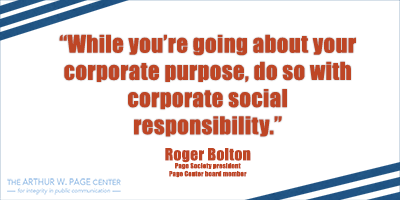Part 1: Q&A with Center board member Roger Bolton
April 30, 2018

Page Center intern Sarah Vlazny interviewed Arthur W. Page Society president and former Aetna senior vice president of communications Roger Bolton. This installment is the first of three blog posts covering Vlazny's discussion with Bolton, who is also a member of the Page Center advisory board. In the the current post, Bolton talks about corporate advocacy and its role in a corporation's existence.
Why do you think we’re seeing more and more CEO and corporate advocacy?
There are a couple of reasons. The first is that there is more demand for it. Primarily employees, but increasingly now shareholders with Larry Fink’s letter, are expecting corporations to create social, not just customer and shareholder, value. I think of social value in three categories.
Category one: Why do you exist? What is your corporate purpose? What value do you create in the world? The obvious answer is that a company makes products and sells them, which has value to the people who buy them, and that creates value for shareholders. But what is the social value? What is the larger value that’s created on the planet by virtue of the fact that you’re in the business you’re in?
At Aetna we sold health insurance. So you could ask, what’s the purpose of that? Well, it’s to provide health insurance for our customers who want to get coverage for their employees. But the real purpose is to help people get access to healthcare they need while protecting their finances in the case of a serious illness. So it’s to help people achieve health and financial security. That’s why Aetna exists. That’s the reason we’re in business.
Category two: While you’re going about your corporate purpose, do so with corporate social responsibility. By that I mean protecting the environment, respecting human rights, treating your employees well and living by a set of values where you pursue that objective in the most responsible way possible.
For example, say you’re Ford Motor Company. Why do you exist? You don’t exist to protect the environment; you exist to provide transportation. What’s the value in that? Human mobility; moving people from point A to point B enriches their lives. Your corporate social responsibility is to be as environmentally responsible as you can be as you pursue that mission.
Category three: Social activism. It’s relatively new that CEOs are beginning to speak out and companies are beginning to take stands on policy issues. And it’s because first, there’s more of an expectation and demand for employers to speak out on political and social issues. Second, it’s because there’s a vacuum. In other words, government is becoming somewhat ineffective at dealing with some of these issues and there’s a realization that CEOs and companies can be influential. Companies have found that they can be successful at changing policy in a way that’s positive.
There’s research done by Chatterji and Toffel that shows that CEOs can enhance their brand and achieve better customer loyalty if they speak out responsibly on issues.
Are there any other advantages and disadvantages that you haven’t mentioned that you think corporations and CEOs need to consider when they look at corporate advocacy?
CEOs don’t need to feel an obligation to speak out on every issue. There are thousands and thousands of political and social issues out there that you could take a stand on, but that’s not what you’re in business for. That’s what government is for, and what NGOs are for. You’re in business to pursue your corporate purpose. So I think you should stick to business, but be aware that there are, from time to time, issues that affect your company directly. There are issues that are related to values that you hold very deeply, and that you have a good reason to take a position on. You should think clearly and carefully about which issues to take a stand on and then do so with the knowledge that not everyone may be happy about it, but that there are times when it’s the right thing to do. Sometimes it’s imperative for you as a company to take a stand because of your values and beliefs and because of the way it affects your company and its employees.

